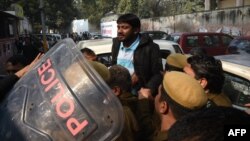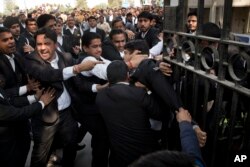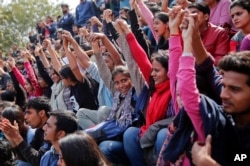A university student union leader facing sedition charges in India was attacked outside a New Delhi court Wednesday, days after he was arrested.
Last week’s detention of Kanhaiya Kumar, a student at Jawaharlal Nehru University, has fueled widening protests by students and teachers demanding his release and counter protests by those who say they will not tolerate anti-national activities. The detention has also led to charges by critics the government is stifling student activism on campuses.
Violence outside courtroom
A group of lawyers shouting nationalist slogans allegedly kicked and punched Kumar when he was brought to court for a hearing and pelted stones at journalists present. The violence took place despite a Supreme Court order for police to ensure safety on the premises, where similar scuffles erupted Monday.
Kumar was detained following a recent police crackdown at the prestigious university, where a group of people chanted anti-government slogans at an event marking the 2013 execution of a Kashmiri convicted for his role in a 2001 attack on India's parliament.
A University of Delhi professor has also been detained on sedition charges and police are mounting raids to hunt for others who shouted anti-India slogans.
Senior government ministers have defended Kumar’s arrest and say shouting slogans that speak of “splitting India into pieces” will not be tolerated.
Parliamentary Affairs Minister Mukhtar Abbas Naqvi said forces trying to unite the nation will not spare those who are trying to divide it. At a rally led by the ruling Bharatiya Janata Party, or BJP, Wednesday in Delhi, he defended the action against Kumar, saying, “All students at the university were not enemies of the country, but some students are using the campus for anti-national activities.”
Political activism
The traditionally left-leaning student union at Jawaharlal Nehru University is known for its political activism.
Many are questioning the sedition charges against Kumar. They say India’s sedition laws are a relic of British colonial rule that need to be scrapped and brought in line with a free and democratic society.
Accusing Kumar of sedition is "ridiculous," said Ajoy Bose, an independent political analyst in Delhi.
“Sedition has been repeatedly defined as any act which incites violence or leads to violence immediately, so there is no case for the police to have rushed in there, and the kind of search and harassment of students and teachers which has followed. This is quite, quite, quite unprecedented,” said Bose.
In an appeal Wednesday, student leader Kumar said he does not support anti-national activities and called for calm on campuses and courtrooms. He is being held in custody until March 2.
Opposition party and free speech activists are linking the police crackdown on students at Jawaharlal Nehru University to what they say is a rising tide of intolerance within the right-wing BJP and its affiliates.
Concerns are also being voiced about the violence witnessed outside the courtrooms in Delhi. “In some of its highest courts, if this sort of thing can happen, then this leads to complete anarchy. This is something quite serious,” said political commentator Bose.


